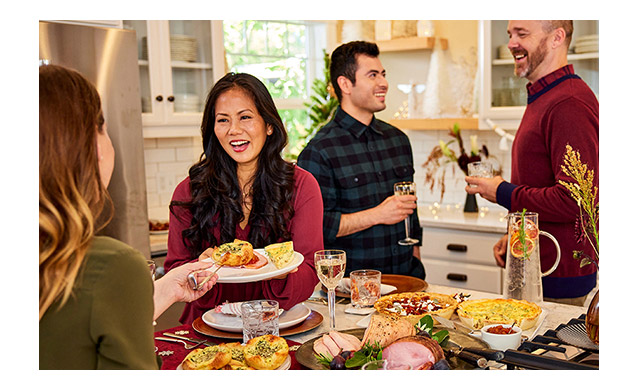Thanksgiving’s Lasting Legacy: How Gratitude Grows Beyond the Long Weekend
As Thanksgiving weekend winds to a close, but its legacy of gratitude continues into the holidays.
Nov 25, 2023
Written by our Founder and CEO, the Celebrations Pulse letters aim to engage with our community. By welcoming your ideas and sharing your stories, we want to help you strengthen your relationships with the most important people in your life.
I hope everyone had a wonderful Thanksgiving weekend full of friends and family, delicious food, and enriching rituals.
The funny thing about Thanksgiving is that its spirit never seems to fade even on the last day of the long weekend. Instead, it just morphs into the holiday season, where rituals, gratitude, and great food continue to abound. Perhaps this past week was just a trial run for all the celebrations ahead of us.
I was reminded of this while reading the Thanksgiving rituals shared by our community. In story after story, you wrote about activities that bring people together and deepen the celebration of gratitude. More than a few look ahead to the December holidays that are just a few weeks away.
I hope you find these stories as inspiring as I do.

Giving thanks all season long
At Kathy’s house, Thanksgiving is only the beginning of a multi-week celebration. She shared two special days with us: Soup Day and Fondue Night.
Soup Day takes place Thanksgiving weekend. Whoever cooked the turkeys for the big feast is responsible for making the soup out of the leftovers. Others then use an old family recipe to bake bread. After dinner, everyone sits down in the living room to look at Kathy’s photo albums – all 35 of them!
I have pictures going back from the late 1800s and the turn of the 20th century – all the way to today (or a few years ago, when I was still shooting film). Nobody seems to get tired of it, and we get to tell funny remembrances triggered by the photos.
Another tradition takes place at the end of the holidays. On New Year’s Eve, she celebrates Fondue Night – a tradition that started more than 60 years ago “mostly to keep folks off the streets.”
We can have as little as six folks or as many as 40, it doesn't matter. We have cheese fondue, steak fondue, shrimp fondue, and chocolate fondue, with platters laden with stuff to dip in, and sauces for the plates. Little children under 5 have to sit on an adult's lap to learn how to manage a fondue fork (no fork fights allowed!). We are five generations in now and I hope it will continue when I am gone.
Expanding the Thanksgiving table and other rituals
Last week, I wrote about how a relatively new McCann family tradition – Papa’s Turkey Tacos – has evolved in recent years. After we moved it from Thanksgiving to the following Sunday, we started inviting neighbors and friends to the backyard festivity.
Susan, a community member, shared how the inclusion of more people is a highlight of the holiday:
I'm grateful for how every year brings a new member of our family, and I love seeing everyone around the table.
Many people shared that their biggest Thanksgiving tradition is kicking off the holiday season. Lindsay wrote about how she gets everyone moving and burning off calories after the Thanksgiving feast:
Once everybody eats, we pull out all the Christmas stuff, and every year we try to do a little bit of a different theme. Our favorite Thanksgiving activity is to decorate the Christmas tree.
And, lastly, we heard from Ann, whose growing family has developed some very competitive rituals thanks to her two grown sons. She tells me they’re 20 months apart, the best of friends, and brutally competitive. During COVID, they invented the Dirty Pot Turkey Trot, a run to the end of a long field and back that everyone heads outside to watch the moment the Thanksgiving meal is over. Ann shares:
The fact that their meals have not even begun to digest is half the point. The loser is responsible for the kitchen cleanup and dishes. Needless to say, we all do pitch in and help, but the Dirty Pot Turkey Trot is now a much anticipated tradition that brings howls of laughter the year through. (Did I mention that neither of them are above cheating, throwing elbows, and foot swipes to win the race?)
Happy Thanksgiving to everyone in our community!
Jim








